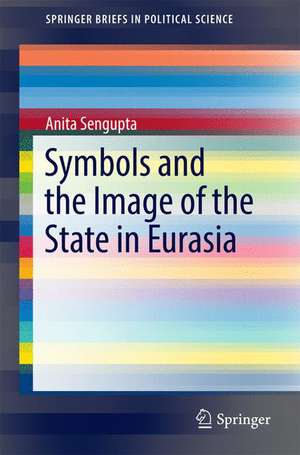Symbols and the Image of the State in Eurasia: SpringerBriefs in Political Science
Autor Anita Senguptaen Limba Engleză Paperback – 24 oct 2016
Din seria SpringerBriefs in Political Science
-
 Preț: 410.94 lei
Preț: 410.94 lei -
 Preț: 259.57 lei
Preț: 259.57 lei -
 Preț: 375.62 lei
Preț: 375.62 lei -
 Preț: 478.53 lei
Preț: 478.53 lei -
 Preț: 411.16 lei
Preț: 411.16 lei -
 Preț: 379.48 lei
Preț: 379.48 lei -
 Preț: 226.22 lei
Preț: 226.22 lei -
 Preț: 378.71 lei
Preț: 378.71 lei -
 Preț: 342.25 lei
Preț: 342.25 lei -
 Preț: 379.48 lei
Preț: 379.48 lei -
 Preț: 443.58 lei
Preț: 443.58 lei -
 Preț: 125.07 lei
Preț: 125.07 lei -
 Preț: 358.32 lei
Preț: 358.32 lei -
 Preț: 475.65 lei
Preț: 475.65 lei -
 Preț: 379.48 lei
Preț: 379.48 lei -
 Preț: 375.84 lei
Preț: 375.84 lei -
 Preț: 378.54 lei
Preț: 378.54 lei -
 Preț: 342.84 lei
Preț: 342.84 lei -
 Preț: 379.68 lei
Preț: 379.68 lei -
 Preț: 309.04 lei
Preț: 309.04 lei - 15%
 Preț: 520.30 lei
Preț: 520.30 lei -
 Preț: 380.84 lei
Preț: 380.84 lei -
 Preț: 374.85 lei
Preț: 374.85 lei -
 Preț: 377.73 lei
Preț: 377.73 lei -
 Preț: 378.54 lei
Preț: 378.54 lei -
 Preț: 444.94 lei
Preț: 444.94 lei -
 Preț: 374.85 lei
Preț: 374.85 lei -
 Preț: 476.21 lei
Preț: 476.21 lei -
 Preț: 377.73 lei
Preț: 377.73 lei -
 Preț: 444.13 lei
Preț: 444.13 lei -
 Preț: 446.65 lei
Preț: 446.65 lei -
 Preț: 444.52 lei
Preț: 444.52 lei -
 Preț: 376.59 lei
Preț: 376.59 lei -
 Preț: 376.59 lei
Preț: 376.59 lei -
 Preț: 375.07 lei
Preț: 375.07 lei -
 Preț: 261.53 lei
Preț: 261.53 lei -
 Preț: 376.22 lei
Preț: 376.22 lei -
 Preț: 259.57 lei
Preț: 259.57 lei -
 Preț: 380.07 lei
Preț: 380.07 lei -
 Preț: 261.32 lei
Preț: 261.32 lei -
 Preț: 375.45 lei
Preț: 375.45 lei -
 Preț: 310.18 lei
Preț: 310.18 lei -
 Preț: 378.54 lei
Preț: 378.54 lei - 5%
 Preț: 356.11 lei
Preț: 356.11 lei -
 Preț: 477.34 lei
Preț: 477.34 lei -
 Preț: 343.72 lei
Preț: 343.72 lei - 15%
 Preț: 462.05 lei
Preț: 462.05 lei -
 Preț: 379.30 lei
Preț: 379.30 lei -
 Preț: 378.71 lei
Preț: 378.71 lei
Preț: 379.86 lei
Nou
Puncte Express: 570
Preț estimativ în valută:
72.70€ • 75.61$ • 60.01£
72.70€ • 75.61$ • 60.01£
Carte tipărită la comandă
Livrare economică 14-28 aprilie
Preluare comenzi: 021 569.72.76
Specificații
ISBN-13: 9789811023910
ISBN-10: 9811023913
Pagini: 177
Ilustrații: XI, 138 p.
Dimensiuni: 155 x 235 x 8 mm
Greutate: 0.22 kg
Ediția:1st ed. 2017
Editura: Springer Nature Singapore
Colecția Springer
Seria SpringerBriefs in Political Science
Locul publicării:Singapore, Singapore
ISBN-10: 9811023913
Pagini: 177
Ilustrații: XI, 138 p.
Dimensiuni: 155 x 235 x 8 mm
Greutate: 0.22 kg
Ediția:1st ed. 2017
Editura: Springer Nature Singapore
Colecția Springer
Seria SpringerBriefs in Political Science
Locul publicării:Singapore, Singapore
Cuprins
Chapter 1. Introduction.- Chapter 2. The Politics of Nation Branding in Uzbekistan.- Chapter 3. The Heart of Eurasia and the ancient land of the Kazakhs.- Chapter 4. Reconstructed Pasts: The state and its margins.- Chapter 5. Multicultural Societies and Imperatives of a ‘Singular Faith’.- Chapter 6. The Emergence of a New Dialogue? Regional strategies and initiatives.- Chapter 7. Conclusions: The Politics of Symbolism.
Notă biografică
Anita Sengupta is Senior Researcher, Calcutta Research Group and Visiting Fellow, Observer Research Foundation, India. She is an area studies specialist and her work has been focused on the Eurasian region with Uzbekistan being her area of special interest. She has also worked extensively on Turkish politics. She has collaborated with academics and policy makers in a number of Universities and Institutes in Tashkent, Bishkek, Almaty, Ankara, Istanbul, Berlin, Washington and has published jointly with scholars in the Eurasian region. She has been associated with the Stockholm International Programme for Central Asian Studies, SIPCAS and the Nordic Network for Research on Migration, Identity, Communication and Security. Her book Heartlands of Eurasia: The geopolitics of political space (Lexington Books: 2009) was selected by the Oxford Bibliographies Online in 2011 as a must read on the section Geopolitics and Geo-strategy. She is also the author of Russia, China and Multilateralism in Central Asia (Shipra 2005) The Formation of the Uzbek Nation-State: A Study in Transition (Lexington Books 2003) and Frontiers into Borders: The Transformation of Identities in Central Asia (Greenwich Millennium Press 2002) She has edited a number of volumes on Eurasian politics. Her most recent publication is Myth and Rhetoric of the Turkish Model: Exploring Developmental Alternatives (Springer 2014).
Caracteristici
Reflects a shift from the modern world of geopolitics and power to a postmodern world of images and influence in the Eurasian region Contributes to a broader understanding of representation, power, and identity in Uzbekistan and Kazakhstan Useful addition to the corpus of studies on post-Soviet states that examines the region from similar experiences of post-colonial nation building and transition Includes supplementary material: sn.pub/extras
















